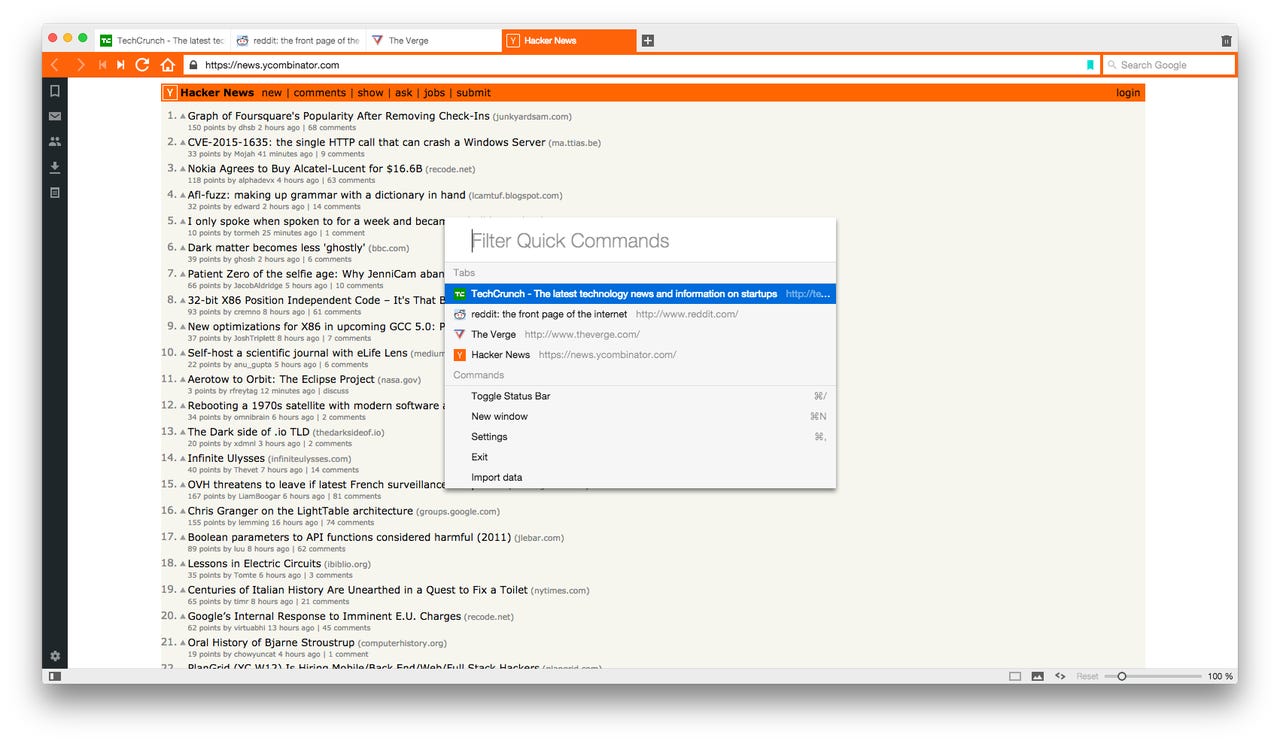Always opening new tabs? Like to do things your way? Vivaldi could be the browser for you


The co-founder and fifteen years' CEO of Opera Software, where the Opera web browser was developed, made a rather emotional departure from the company in 2011. At the time, he said he had plans, but didn't divulge precisely what his next move would be.
In 2013, Opera announced its intention to shut down its Opera user community website, My Opera. Six weeks after that, Tetzchner launched the website Vivaldi.net, and wrote a personal welcome message saying the site was there for ex-My Opera users. Tetzcher's team had just started to develop a completely new web browser for advanced or 'power' users: Vivaldi.
Vivaldi has now been in development for around 18 months, and the third version of the technical preview is available for download.
Why another web browser?
Tetzchner recently explained to ZDNet the reasons why the world needs Vivaldi.
"If you take into account the number of users of the web today, we're talking about more than two billion, and that number is steadily growing. Seen from that perspective, there aren't that many web browsers on the market.
"But the main point is that all the other web browsers on the market are all going in the same direction. They are trying to make a browser that fits all. This results in a relatively simple browser, so everybody will be able use it. We're working towards a completely different market. We're going to make a browser that's able to do much more - a browser made for people who spend more time online, and care about which browser they're using," he said.The change Opera made around the time Tetzchner quit the company saw Opera's uniqueness sacrificed in order to attract more users, and in the process, disappointing a lot of the old users who had loyally followed Opera for years, he said. The simplification of Opera's user interface and functionality put those advanced users off, as did the decision to shut down its community website. It's for those users, and others like them, that Vivaldi is made, explained Tetzchner.
"We're starting up now as a result of seeing a need in the market for a more advanced browser, and because we discovered ourselves that there are no browsers that satisfy our own needs," he said.
Tabs, tabs, and more tabs
What makes an 'advanced user' is demonstrated by the browser's functionality: the emphasis is on managing a large number of open web pages and maintaining a lot of bookmarks. Tetzchner described the browser as being used with several tens of open web pages in tabs - stacks and stacks of tabs.
The way that Vivaldi is operated is also different to other browsers: Vivaldi allows users to carry out the same function using a number of different methods, a conscious decision by the design team.
"A basic design criterion for us is to provide several different ways of doing things. In reality, people are different, and they prefer to do things differently. Personal preference is key," Tetzchner said.
This emphasis on choice is one aspect that makes the casual user different from the advanced user, from Vivaldi's point of view.
"If you're only using the web as a casual user, who's just reading the newspapers and logs onto Facebook, and maybe watches a video on YouTube, then you're not a user for us. But if you spend a lot of time online, view a lot of pages, want to remember where you found things and want to be able return to them, then we've got a lot of different ways to achieve that. Depending on how you prefer to manage that as a user, you'll find the method that suits you best. Whether that's bookmarks, open tabs, notes, tab stacks, or different sessions with a lot of open tabs - we will adapt to how you prefer to work," Tetzchner added.
A few million users
It's obvious that Vivaldi isn't aiming to become a mass market browser. However, in Tetzchner's view, they don't need a market share into the double digits in order to succeed.
"Opera makes a little bit above a dollar per user per year. That is not in any way a high figure, and I think that means they're not over-aggressive on that income model. I think that's the right thing to do, to refrain from being too eager. The thing users don't want is a browser that goes too far with regards to commercial partners included with the browser," he said, citing pre-installed bookmarks and integrated search bars from sponsors. Nevertheless, Tetzchner thinks there's enough of an income basis to make Vivaldi into a sound business.
"If we base the calculation on a dollar per user per year, and use that as a basis, then it's just a question of how many users we need to make the business viable. That is a relatively simple calculation. As you understand, we need some million users, but we've already had more than a million downloads. For a technical preview, we have to be very satisfied with that," Tetzchner said.
"Obviously, we have ambitions, but we'll have to see how far we can reach. Getting a few million users should be manageable," he added.
Beta release is close
Vivaldi currently employs around 30 people, spread between Norway, Iceland, and the US. The company is funded by Tetzchner himself, but even so, he doesn't seem overly anxious to get the company profitable in a hurry - as his response to questions about when Vivaldi is going to release its first full finished version shows.
See also
Development isn't strictly following a plan set in stone either, as the team is constantly looking for innovation.
"If we come up with a fun idea for new functionality, we'll include it. Process-wise, we aren't exactly working waterfall here. It's more like how you're working on the web. Our default answer to when we're going to release is: 'when it's ready'," Tetzchner said.
'For our friends'
Vivaldi has an active user community already, and lots of people are helping out with testing, translating, and general idea generation. That's how it was with Opera, and that's how Tetzchner likes it.
"We're operating under the motto 'for our friends'. That isn't an empty marketing statement. We discussed this in the team and agreed on it, because we feel that describes what we're doing here," he said.
"For me personally, this is not driven by economy. I am funding this myself, and I could have put the money in the bank instead. I am doing this because it's fun, and personally I think the feedback from users is very exciting. When you're creating something and notice people like it, it's really good. From time to time, you also have to handle that they don't like what you're offering, and that's not as fun, but that's also part of getting feedback," he said.
It's obvious why Tetzchner left Opera back in 2011: he's first and foremost product and development-oriented, and wants to stay away from all the other activities that can come alongside running a big business.
"We have no plans of getting on the stock exchange - been there, done that. Clearly, it is a great advantage to be able to focus solely on creating a great product, and be relieved of other concerns," Tetzchner concluded.
Read more on this story